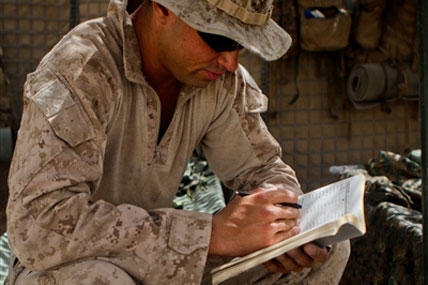PATROL BASE DETROIT, Afghanistan – The Marines are down but not out. The late afternoon sun beats on them, and one Marine wipes sweat from his eyes. Across from them, their opponents smile, seemingly sensing the outcome. With the Olympics fresh in their minds, this is not simply a volleyball game. This is a matter of national pride. Then it happens: a questionable call. Is it a point for the Afghan soldiers on one side of the net, or is it the Marines’ serve? Hand gestures and facial expressions are not enough to explain the concerns of both teams.
Then a Marine steps in, turns to the Afghan soldier and begins pleading the Marines’ case. The only catch is that unlike the others, he is not speaking English and using over dramatic hand gestures. He is speaking Pashtu, the Afghan soldiers’ native language.
For Marine Corps Lance Cpl. Nathan Pontious, a rifleman with Weapons Company, 1st Battalion, 1st Marines, Regimental Combat Team 6, the ability to speak Pashtu helps to build relationships with Afghan soldiers and local residents.
“It really helps when we are patrolling and we run into a family,” Pontious said. “When they see I can speak their language, it usually puts them at ease. We have that common ground, and we can build off it.”
Pontious’ platoon has two interpreters, but has three squads. This means when the entire platoon patrols, one squad usually is left without an interpreter.
“It’s huge having someone like Pontious, who’s a Marine but can also speak Pashtu,” said Marine Corps Sgt. Jason Lomeli, Pontious’ squad leader. “The other day we had to roll out, and the [platoon commander] asked if I was good without an [interpreter]. I responded, ‘Of course I’m good -- I have Pontious.’”
Pontious’ skills often help to mitigate potentially damaging relations with local Afghans. He explains to the head of the household what the Marines are doing and why they are there, and he reassures the family.
But Pontious said what he really enjoys is the part of speaking Pashtu that isn’t work-related.
“I love talking to the children,” the Effingham, Ill., native said. “They are really funny, and I love giving them water or candy and watching their smiles.”
Even when his squad returns from patrols, Pontious’ ability to bridge the language barrier is put to good use. His platoon works closely with Afghan soldiers with 1st Kandak, 1st Brigade, 215th Corps.
Pontious often talks to the Afghan soldiers, trading with them and planning volleyball games.
“We work together like brothers,” said Capt. Aziz Mohammad, commander of the Afghan army’s 3rd Tolai, 1st Kandak, 1st Brigade, 215th Corps.
Pontious attended a three-month language school to learn Pashtu before deploying to Afghanistan, attending grammar classes in the morning and cultural classes in the afternoon. He graduated third in a class of more than 200 students and the highest of any Marine in his battalion.
Before going to the school, Pontious said, he had developed a reputation as a troublemaker and couldn’t seem to shake the misconceptions about him.
“When I first arrived, some of the other leaders warned me about Pontious, saying he might cause issues,” explained Lomeli, from Riverdale, Ill. “I think Pontious was misunderstood. He does everything I ask of him and more, and he’s a great asset to the squad.”
Pontious used his poor reputation as motivation during language school. He volunteered to attend the class, he said, because he learned French easily in high school.
“Honestly, I had some doubters when I left for the course,” Pontious said. “I wanted to prove them wrong, and I ended up getting an A in the course.”
He also keeps his language skills sharp, practicing with a textbook he brought to Afghanistan and asking the interpreters questions. He also uses a Pashtu-to-English dictionary he received from an Afghan soldier. “That helped a lot,” Pontious said. “I take it with me every time we go out.”
Back on the volleyball court, Pontious finishes pleading his case. His explanation seems to satisfy his Afghan counterparts, at least for this point, and within moments the Marines and Afghans are playing again.
“I really think I’m helping to change the perception of Marines [for] the people of Afghanistan,” Pontious said. “I think they see the effort I’ve put in to learn their language and their culture, and I think they appreciate it.”





























